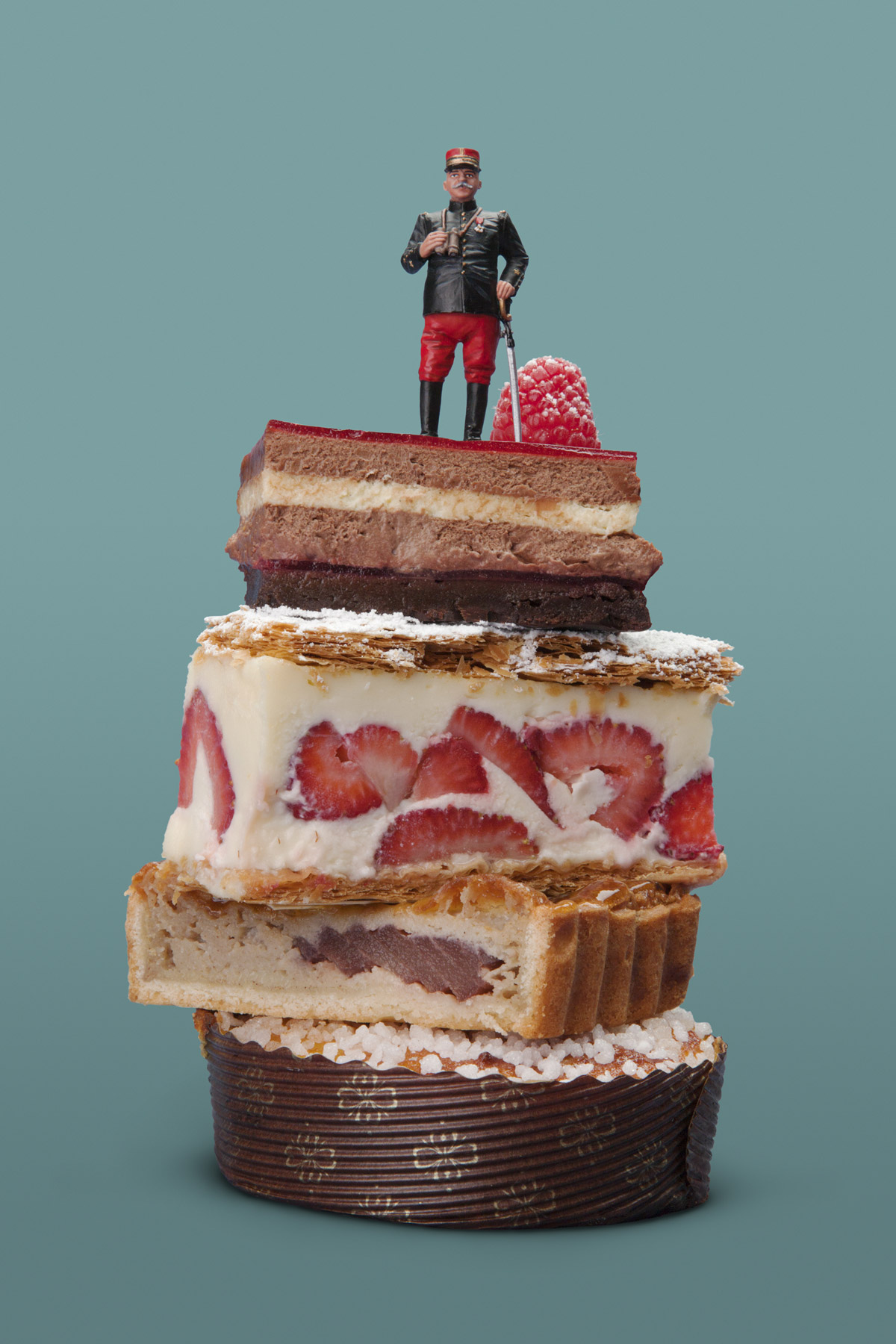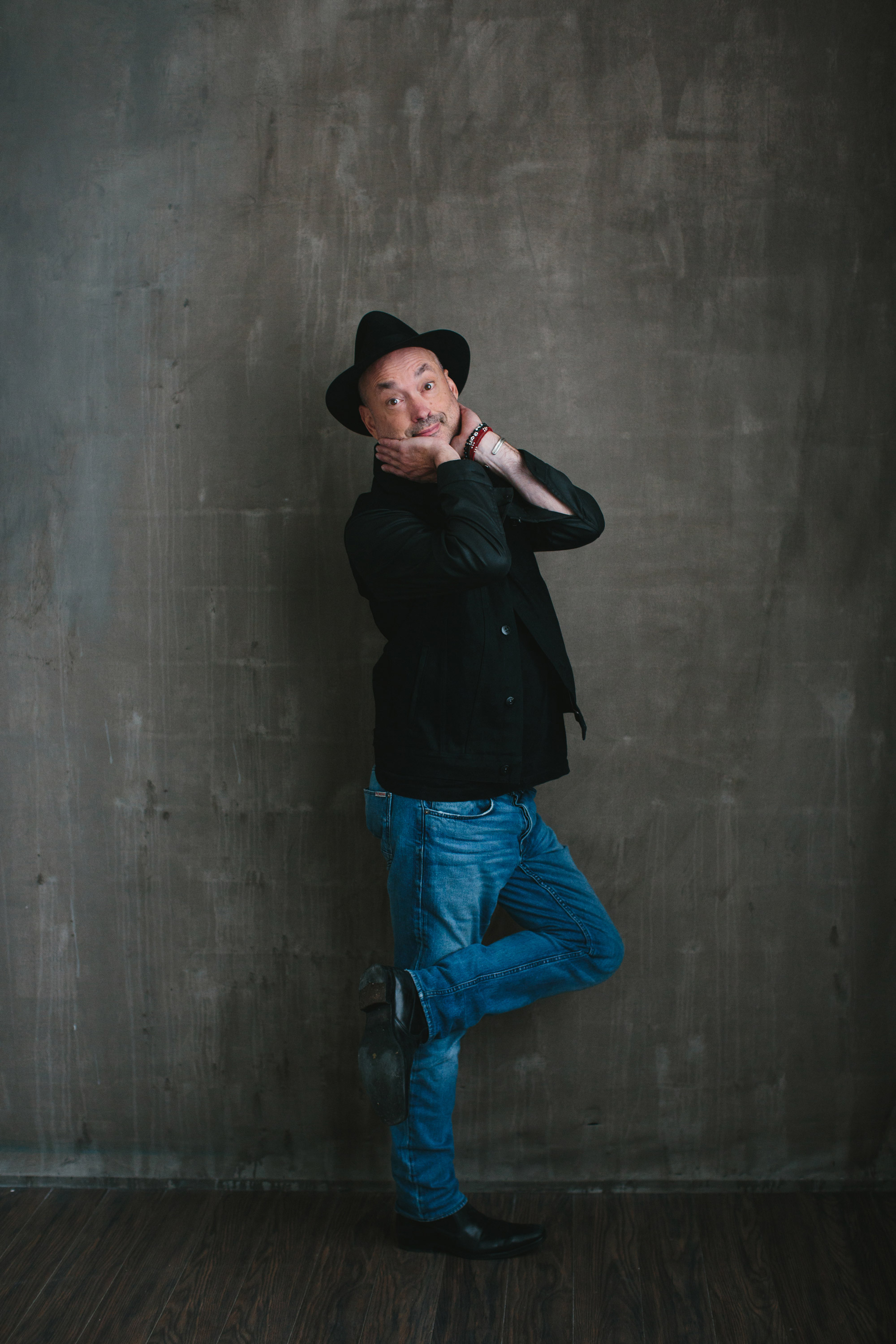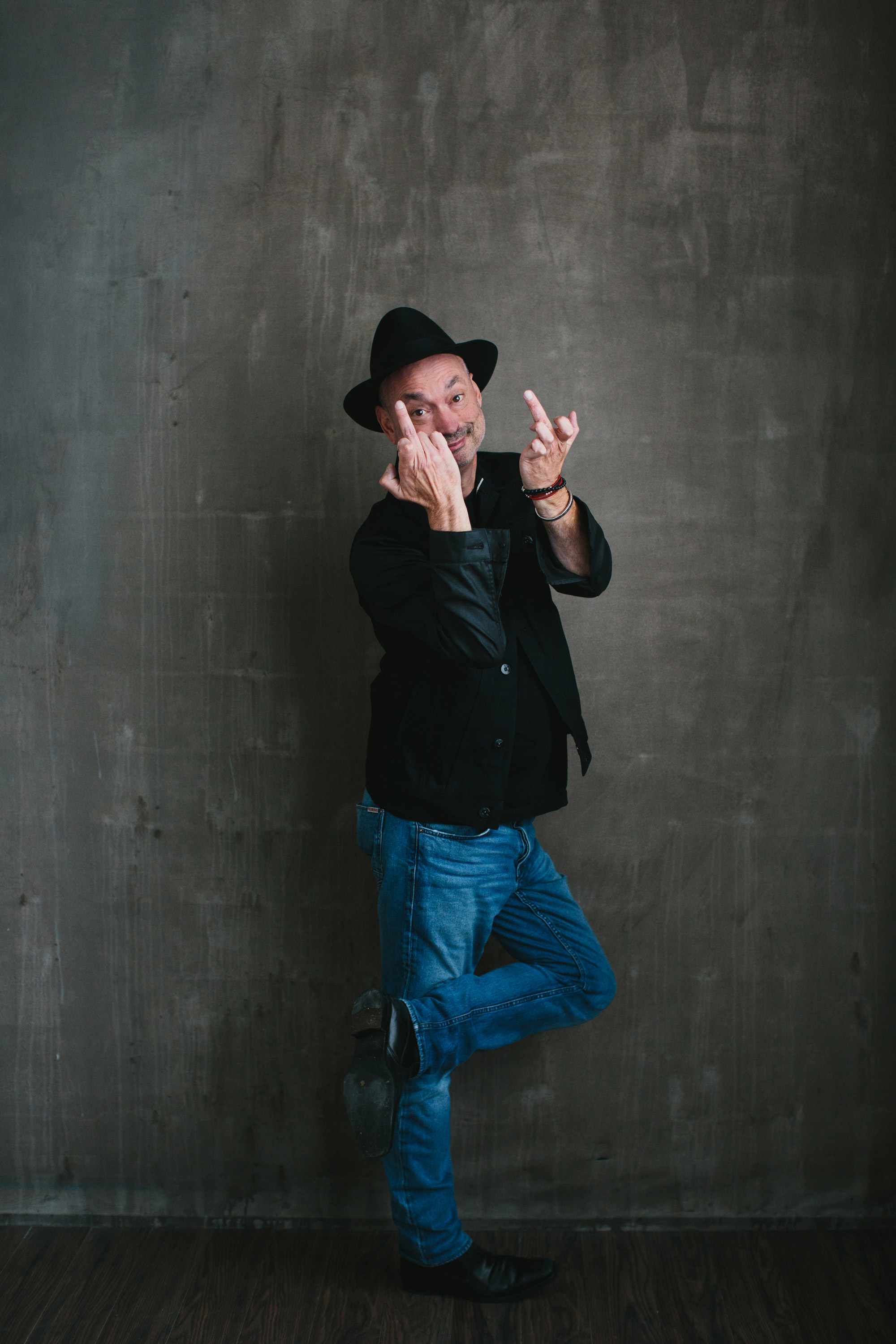
- Interview by Tammi Heneveld October 20, 2015
- Photography by Ashley Courter
Jim Riswold
Jim Riswold, Portland-based artist, writer, and former creative director for Wieden+Kennedy, talks about creating some of the most iconic advertisements of the 20th Century, how appropriating culture leads to innovation, and why we should all aim to make “glorious mistakes.”
- artist
- writer
- creative director
Describe your path to becoming a copywriter and eventual creative director. A lot of people who have nothing better to do than write stuff about me tell me I came to advertising somewhat unconventionally. I suppose you could say I came to advertising from an unconventional background, but only if you consider membership in the American Hegelian Society and a fondness for Nietzsche unconventional. Oh, sure, some Hegel detractors in our industry might claim that believing in the notion of Change, accepting Strife as essential to Progress, arguing dialectically, seeing things as Parts of a Whole, viewing one’s self as a character in the Unfolding of History, and a penchant for thinking in capital letters have no place in advertising.
But what self-respecting advertising professional can argue with Nietzsche’s insistence that the dominant force in history is the will to power? What 4A’s member hasn’t embraced Nietzsche’s call for a “transvaluation of values” in which traditional “feminine” virtues espoused by Christianity—submission, compassion and being nice to other people—are united with “masculine” virtues of courage, strength and toughness, in a new morality whose goal is greatness rather than goodness? Who wouldn’t agree that Nietzsche’s wish for the ascendancy of the Übermensch, or superman, in whom Dionysian instinct and dynamism would be perfectly integrated with Apollonian reason and ethics is a surefire recipe for success in our business?
(Never mind that Nietzsche was a frail, sickly boy raised in a household of pious women, went hopelessly insane at the age of 44, and has been blamed by some for WWII and all its unpleasantness—you get my point.)
Seriously, I think my background in philosophy, as well as an inordinate amount of other liberal arts degrees and credits, has enabled me to look at things in, hopefully, a different way. At the very least, reading the Kants and Hegels of the world provides proof that, yes, there are far more difficult things to comprehend than really dumb client requests and demands.
It has also, in rare moments of lucidity, allowed me to realize there are far more important things in this world than advertising: family, friends, art, Nietzsche, literature, and baked beans. While the baked beans bit may sound flippant, it isn’t; because when you come to grips with the fact that something as inconsequential as baked beans is more important than advertising, it allows you to create great advertising.
I can summarize all my answers to the whole What-good-does-being-able-to-wade-through-Spinoza-do-for-a-career-in-advertising question, by saying philosophy taught me something that’s unfortunately in far too short a supply in advertising: perspective.
It also taught me some really big words.
Short answer: I wasn’t smart enough to do anything other than advertising.
Was creativity part of your childhood? In 1972, at the very impressionable age of 14, I saw my first rock concert. A friend of mine had invited me to see a then relatively, if not completely, unknown musician from England named David Bowie.
He was definitely unknown to me, not because it was Mr. Bowie’s first tour of the United States and he was unknown to all but the extremely hip, but because I was the single most unhip teenager in the Pacific Northwest. I had exactly one record in my music collection, The Charge of the Light Brigade, and the only Bowie I’d ever heard of died at the Alamo and had a knife posthumously named in his honor.
Like I said, I was impressionable and, therefore, things changed after that concert. The Charge of the Light Brigade was replaced by The Rise and Fall of Ziggy Stardust and the Spiders from Mars. Posters of Willie Stargell and Gump Worsley that adorned my room were discarded for every image of a dress-wearing man with orange hair that I could get my hands on.
That concert and the Be Like Bowie (translation: Be Perpendicular) that followed for the next decade were the start of my so-called creativity.

“Creative people are by nature curious. Curiosity is never satisfied. Once curiosity becomes satisfied, then it becomes complacency.”
Have you had any mentors along the way? My mom is my mentor. She put up with my father and me for a whole bunch of decades. She taught me fortitude.
Where do you get your ideas from? Have you had any particular influences over the years? I have never had an original thought in my career.
Everything I have ever done has been borrowed, enlisted, reformulated, regurgitated, turned upside down or inside out, played back at a different speed, and sometimes just plain stolen from either popular culture, music, history, art, literature, the back of cereal boxes, Hegelianism, an athlete’s life, news, a bedtime story my grandmother once read me—whatever.
Anything and everything is fair game when it comes to stimulus. A friend once warned others never to wear a new pair of shoes around me. My lawyers have asked me to point out that this is not plagiarism; it is appropriation.
But, hopefully, what my complete lack of originality did was open up an unlimited number of resources from which to make completely original ads. And, more importantly, maybe it led to more meaningful and enjoyable ways for people to hear an advertiser’s message. I don’t know about you, but I find watching Lou Reed be Lou Reed or Bugs Bunny enlist Michael Jordan to defeat a group of bullies a lot more interesting than sitting through a tediously self-referential regurgitation of a product’s attributes, an all-too-obvious portrayal of the advertiser’s strategy or, worst of all, anything Jim Riswold might have to say.
Once again, anything is fair game; it doesn’t have to be popular culture. I once wrote a long-copy print campaign for Nike Hockey that drew its inspiration from issues debated on the editorial pages of Canadian newspapers about how the game should be played. The campaign took a stand on how the game should be played and, fortunately, Nike had a line of products that were built upon that philosophy. In this regard, the campaign became much more than a bunch of ads, it became a voice in a larger debate.
(And between you, me, and the fence post, all I did most of the time when it came to Michael Jordan or Bo Jackson was find out something interesting that was going on in their lives and turn it into an ad.)
The appropriation style of advertising, of course, has drawn a lot of criticism; namely, that it’s taking the pure and noble of popular culture and tainting it with a “selling message.”
Diehard fans of the long-dead John Lennon hated the Nike “Instant Karma” ad. Some brain-damaged fans of the brain-damaged Lou Reed were up in arms that I shared their Lou with the non-brain-damaged world. My mother was upset with my translation of “I am Spartacus” into “I am Tiger Woods.”
To all these criticisms—yes, even to my mother’s—I replied, and keep on replying, by asking these people to get off their high horses. We’re not talking about sacred texts here; we’re talking about a song, a singer, a book, a TV show or a movie. These are part of popular culture and, in most cases, were not made with a complete disregard for making money.
Furthermore, advertising is a part of popular culture. It should be allowed to draw upon all the inspirations that the rest of popular culture does. If someone does not like this prerequisite of life in America, I suggest ignoring advertising or taking up residence in either Antarctica or China.
However, when using popular culture I do think it’s important to use a higher degree of taste or you might have even more fanatics threatening to burn your house to the ground. For example, on “Instant Karma” there was a lot that Michael Prieve, David Fincher, and I told clients, account executives, and ourselves that we wouldn’t do. This certainly wasn’t because we were more noble than the rest; it was because anything less would cheapen the music and ultimately lessen its impact as a commercial.
But, unfortunately, some people have nothing better to do than sit around and complain about ads all day.
To all the Lennonites who accused me of “bastardizing” him, the following letter is for you:
Dear Jim,
In the Imperial Hotel of Vienna, I turned the TV on and, by chance, saw the final soccer match of Denmark vs. Germany. I was a great game and I suppose the whole of Europe was watching it. As we were all celebrating the victory of the underdog Danish team, John’s voice suddenly started singing “Instant Karma”; the “Instant Karma” ad was running. It was a very moving moment. It brought tears to my eyes. I’m sure many of John’s fans felt the same way.
I came back to New York and turned on the TV; this time it was the Wimbledon tennis match between Agassi and Ivanisevic. Again, at the most exciting moment, “Instant Karma” jumped out from the screen. What an incredible up-note; a strong, energetic message artistically delivered at the most powerful moment!
I thought I should let you know my two chance experiences with the ad and how it hit me. You did it.
With Love,
Yoko Ono
To all the Lou Reed fans I may have upset by “bastardizing” him (never mind that he could have turned down the offer to be in the ad): I got to meet him and you didn’t.
And to my mother (whom I love deeply): It could’ve been worse; it could’ve been “I am Captain Crunch.”
Was there a point when you decided to take a big risk to move forward? Thelonious Monk said, “I take risks. The only cats worthwhile are cats who take risks.” My mother always told me, “Son, you can’t argue with Thelonious Monk.” So I didn’t.
Expanding upon Mr. Monk, my motto has always been, “Make glorious mistakes.” Think of it this way: If you research what a kid wants in a cake, the research will tell you he wants a cake made entirely of icing; after all, icing is the best part. You can’t go wrong with an all-icing cake! The kid will get his guaranteed-not-wrong cake made of icing and that cake will make him throw up. Moral of the story: It’s okay, even good sometimes, to be wrong.


You were diagnosed with leukemia in the summer of 2000. How did that experience influence your ambitions? I had leukemia????!!!!! Leukemia’s bad, right? Seriously. I didn’t want, “Here lies the guy who did that ‘Bo Knows’ commercial” as my epitaph—and I jumped into the art world as a self-proclaimed fake artist. Or, as I like to say, I went from a career of selling things people don’t need to making things they don’t want.
Are your family and friends supportive of what you do? My extremely smart and short sisters are to this day completely confounded by my (so-called) success, and every time they hear or read about it, exclaim, “He’s really stupid! We know; we had to grow up next to him! Ask us! Please!”
My mom, like any good mom, is concerned about Hitler art in general and her son’s Hitler art in particular.
My dad still has no idea what I do. That makes two of us, Dad.
Are you creatively satisfied? Creative people are by nature curious. Curiosity is never satisfied. Once curiosity becomes satisfied, then it becomes complacency.
If you were to give a piece of advice to another creative starting out, what would would you say? I have four pieces of advice for nubile creatives:
- Start every day stupid. If you start every day stupid you start every day without inhibition and inhibition is creativity’s kryptonite.
- I recommend vodka. Drinking destroys inhibition. Inhibition kills creativity. I will not pontificate on drinking’s less-than-stellar effect on livers because that would be quite hypocritical of me and my mom always said, “Eat your vegetables and don’t be a hypocrite.” So if you want to protect your liver and be creative, skip the vodka thing and stick to the uninhibited thing.
- Creativity is trying different things and then more different things. Picasso, no slouch in the trying-different-things department, pointed out, “God invented the giraffe, the elephant, the cat…He has no real style. He just goes on trying things.”
Creativity demands making a fool out of yourself. You cannot be creative unless you are willing to walk around with your pants around your ankles.
- Andre Breton said you have zero chance of being creative unless you can visualize a horse galloping on a tomato. I like Andre Breton. I like tomatoes. I am not too fond of horses. Speaking of horses, I hated Spielberg’s War Horse. Only Spielberg could get a horse to overact. The movie should’ve been called My Friend Flicka Goes to War.
And here’s advice for an unasked question: my advice for creative directors. I’ve always said, “Hire Brutus.” By that I mean hire the person who is going to take your job. Cultivate that person to take your job, hopefully without all of the knives and blood associated with Caesar’s Brutus in March of 44 BC. You will be surprised by the outcome because it doesn’t involve putting you out to pasture: it involves two people growing.
What kind of legacy do you hope to leave? I want my tombstone to read, “OOOPS.”
About Jim
Jim Riswold is the former creative director for Portland-based advertising agency, Wieden+Kennedy, and an instructor for the agency’s experimental advertising school, WK12. He studied communications, philosophy, and history at University of Washington and was Wieden+Kennedy’s first copywriter hire in 1984. During his time there, Riswold created advertising campaigns such as the famous Bugs Bunny/Jordan pairing, the “Bo Knows” Nike campaigns featuring Bo Jackson, and the Tiger Woods commercial, “I Am Tiger Woods.” In 2000, he was diagnosed with leukemia and, five years later, quit advertising to become a full-time contemporary artist. His photographs have been shown in galleries throughout the Northwest and hang in the permanent collections of several museums. He was inducted into The One Club’s Creative Hall of Fame in 2013.
“Seriously, I think my background in philosophy, as well as an inordinate amount of other liberal arts degrees and credits, has enabled me to look at things in, hopefully, a different way…It has also, in rare moments of lucidity, allowed me to realize there are far more important things in this world than advertising…”

